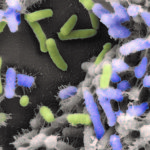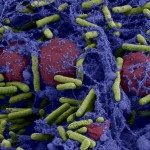Lien vers Pubmed [PMID] – 30936108
Antimicrob Agents Chemother. 2019 May 24;63(6). pii: e00069-19. doi: 10.1128/AAC.00069-19. Print 2019 Jun.
Formation of bacterial biofilms is a major health threat due to their high levels of tolerance to multiple antibiotics and the presence of persisters responsible for infection relapses. We previously showed that combination of starvation and induction of SOS response in biofilm lead to increase levels of persisters and biofilm tolerance to fluoroquinolones. In this study, we hypothesized that inhibition of the SOS response may be an effective strategy to target biofilms and fluoroquinolone persister cells. We tested the survival of Escherichia coli biofilms to different classes of antibiotics in starved and non-starved conditions and in presence of zinc acetate, a SOS response inhibitor. We showed that zinc acetate potentiates, albeit moderately, the activity of fluoroquinolones against E. coli persisters in starved biofilms. The efficacy of zinc acetate to increase fluoroquinolone activity, particularly tosufloxacin, suggests that such a combination may be a potential strategy for treating biofilm-related bacterial infections.




